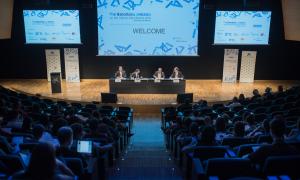A 'shield' made of microbes

The immune system protects us from the microorganisms in our environment. It is permanently working and, if it fails, we find ourselves helpless against bacteria, fungi, viruses or any other pathogen. Even so, microorganisms are not always harmful. Since a few years ago, scientists have been deepening in the study of the microbiome, microorganisms that inhabit our body and acts as a second shield. Recent publications highlight, for example, the important role that our gut bacteria play in modifying the response of our body to cancer therapies or toxicity of treatments. This is one of the points that will be discussed during the fourth edition of The Barcelona Debates on the Human Microbiome. From Microbes to Medicines, which take place on June 21-22 at CosmoCaixa Barcelona.
The debate is organized by the IrsiCaixa AIDS Research Institute, with the collaboration of the Vall d'Hebron Research Institute (VHIR), the Girona Biomedical Research Institute, the University of Vic, the Spanish National Cancer Research Centre and the Germans Trias i Pujol University Hospital. “la Caixa” Banking Foundation, MSD and the Mandarin Oriental Hotel are sponsors, with the logistical support of FLS-Science.
Our 'second genome'
For each human cell in our body, there are at least one or two microorganisms. “This means that the concept of an individual must be modified because we have not only the genes that correspond to us as mammals, but all the genotypes of the microbes we have. In fact, the majority of genetic information in our body is actually information from this community of microbes,” explains Dr Roger Paredes, PI of the IrsiCaixa Microbial Genomics group and scientific leader of the congress together with Dr Bonaventura Clotet, IrsiCaixa Director, and Dr Francisco Guarner, researcher of the VHIR Digestive Physiology and Pathophysiology group. Paredes group will discuss during the congress on how the microbiome modulates the immune response of HIV-infected people.
Microbiome and cancer
In the case of stem cell transplants to treat leukaemia and other haematological diseases, it has been observed that patients with a lower diversity of bacteria in their microbiota at the time of transplantation had a higher mortality rate, compared to those with more diversity. In addition, some studies have found that the proliferation of certain bacteria was associated with a decrease of mortality in cases where the transplant caused graft-versus-host disease (GvHD). There are ongoing clinical trials to try to reduce the risk of GvHD by the intervention of the microbiota through diet and/or faecal transplants.
In the field of cancer immunotherapies, some studies suggest that taking antibiotics before treatment might reduce its efficacy. Many efforts are also being made to try to identify in the microbiota prediction markers of resistance and response to treatments.
This field will be discussed at the conference by Conrad Rauber, from the Gustave Roussy center (France), and Mani Arumugam, from the University of Copenhagen. Both will talk about the role of the microbiota in the response to cancer immunotherapies and the study of the composition of the microbiota as a progression marker of colon cancer, respectively.
Towards a precision medicine
This is one of the reasons why the relation of the human species with the microorganisms is paradoxical. “Microbes have always been seen as enemies, and partly they are. But it is a huge world made up of millions of species, and only a few of them are pathogens. Relationship we have had with them until now was pathogenic, but in reality the vast majority of them are beneficial,” says Ricard Guerrero, Emeritus Professor of Microbiology at the University of Barcelona, who is in charge of the opening lecture of the congress.
This makes the microbiome a very broad and transversal field, which must be considered as part of our ecosystem and with which we interact, in order to get the most out of this relationship. “As we move towards a more precise and personalized medicine, it becomes more essential to increase the knowledge in the field of the microbiome and its modulation,” explains Guarner.